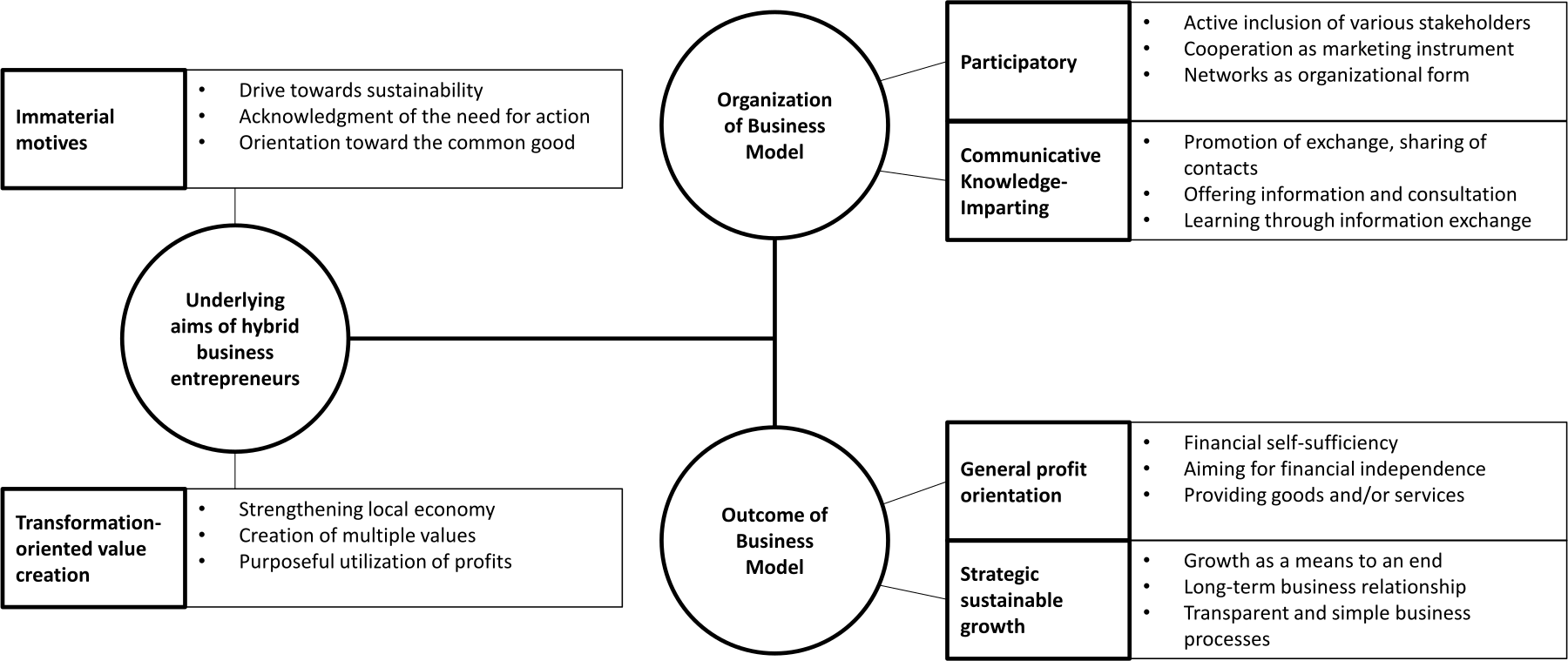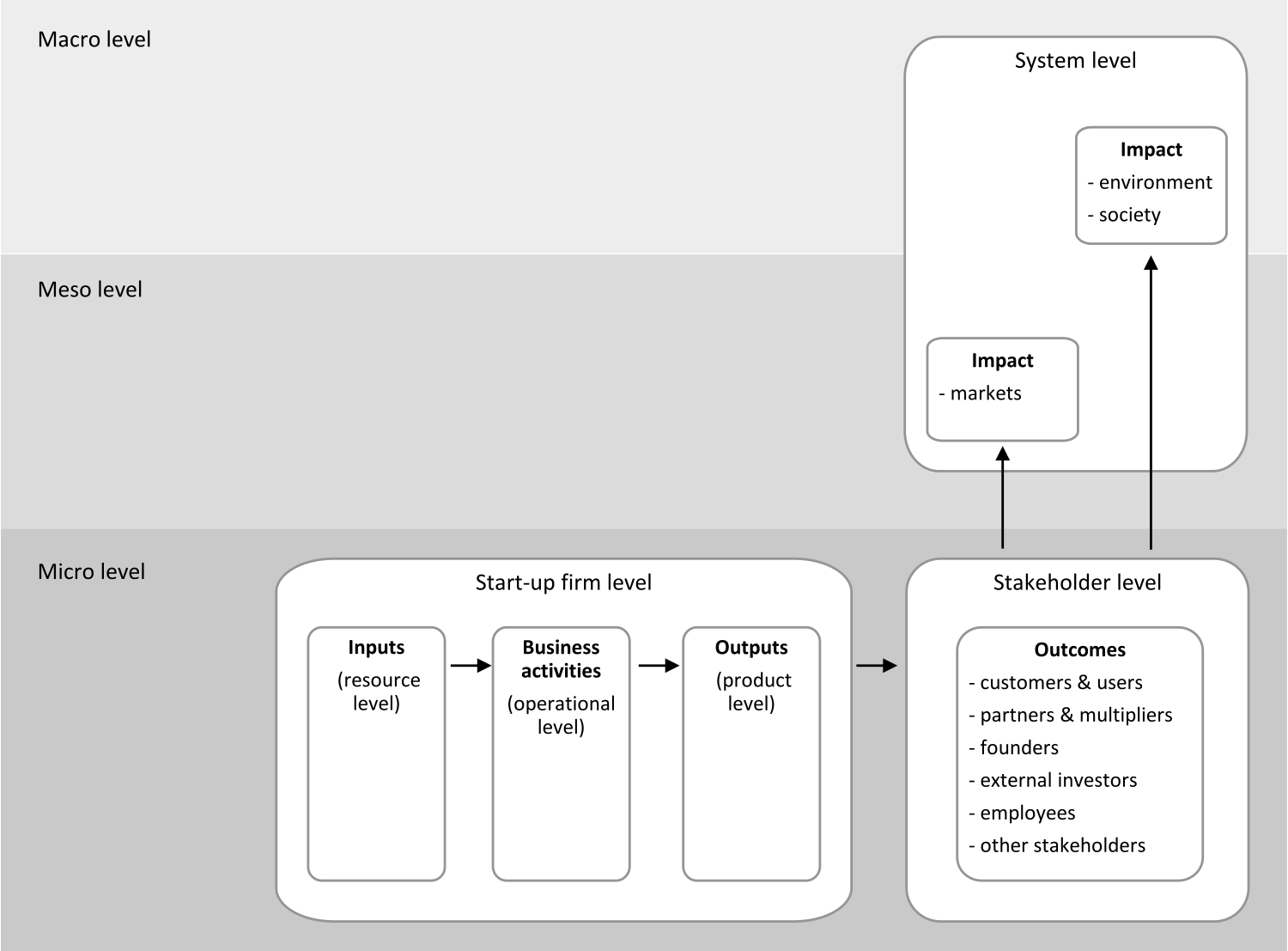Article Peer-Reviewed
To What Extent Do Hybrid Start-ups Strive for Different Impact? Insights from Explorative Case Studies
Borderstep Institute for Innovation and Sustainability, 14169 Berlin, Germany
Received: 31 May 2023 Accepted: 27 October 2023 Published: 2 November 2023
This article is part of the Special Issue Capturing the Sustainable Impact of Early-Stage Business Models.
Abstract
The purpose of this article is to advance the sustainable entrepreneurship research context by establishing an in-depth understanding of the aspired successes and related sustainability results of hybrid and non-hybrid start-ups against the background of a multi-level perspective. The insights are generated through an explorative multiple-case-study approach including twelve German start-up companies both hybrid start-ups and non-hybrid start-ups. There is limited research that conceptualizes aspired successes applying a multi-level view to the firm level of start-ups. This article provides comprehensive insights into different success and result categories of sustainable entrepreneurship and provides both future research as well as practitioners with a clear directive of how to navigate in the hybrid start-up context. Finally, the discussed differences and similarities between hybrid start-ups and non-hybrid start-ups draw a clearer though differentiated line between these two archetypes of start-ups.
Figures in this Article
Keywords
Copyright © 2023
Trautwein. This article is distributed under the terms of the Creative Commons Attribution License (CC BY 4.0), which permits unrestricted use and distribution provided that the original work is properly cited.
Funding
This work was supported by the research project “Grüne Gründungen als Transformationsmotor stärken” (Strengthening green start-ups as drivers of transformation), which was funded by the German Federal Environmental Foundation (Funding ID 33405/01) and implemented by the Borderstep Institute for Innovation and Sustainability, Berlin, Germany and the Department of Business Administration, Economics and Law, Innovation Management and Sustainability, Carl von Ossietzky University of Oldenburg, Germany.
Cite this Article
Trautwein, C. (2023). To What Extent Do Hybrid Start-ups Strive for Different Impact? Insights from Explorative Case Studies. Highlights of Sustainability, 2(4), 224–240. https://doi.org/10.54175/hsustain2040016
References
1.
Dean, T. J., & McMullen, J. S. (2007). Toward a theory of sustainable entrepreneurship: Reducing environmental degradation through entrepreneurial action. Journal of Business Venturing, 22(1), 50–76. https://doi.org/10.1016/j.jbusvent.2005.09.003
2.
Hall, J. K., Daneke, G. A., & Lenox, M. J. (2010). Sustainable development and entrepreneurship: Past contributions and future directions. Journal of Business Venturing, 25(5), 439–448. https://doi.org/10.1016/j.jbusvent.2010.01.002
3.
Binder, J. K., & Belz, F. M. (2015). Sustainable Entrepreneurship: What It Is. In P. Kyrö (Ed.), Handbook of Entrepreneurship and Sustainable Development Research (pp. 30–75). Edward Elgar Publishing.
4.
Kuckertz, A., & Wagner, M. (2010). The influence of sustainability orientation on entrepreneurial intentions — Investigating the role of business experience. Journal of Business Venturing, 25(5), 524–539. https://doi.org/10.1016/j.jbusvent.2009.09.001
5.
Wagner, M. (2012). Entrepreneurship, Innovation and Sustainability. Greenleaf Publishing.
6.
Hockerts, K., & Wüstenhagen, R. (2010). Greening Goliaths versus emerging Davids — Theorizing about the role of incumbents and new entrants in sustainable entrepreneurship. Journal of Business Venturing, 25(5), 481–492. https://doi.org/10.1016/j.jbusvent.2009.07.005
7.
Bergset, L., & Fichter, K. (2015). Green start-ups – a new typology for sustainable entrepreneurship and innovation research. Journal of Innovation Management, 3(3), 118–144. https://doi.org/10.24840/2183-0606_003.003_0009
8.
Linnanen, L. (2002). An Insider’s Experiences with Environmental Entrepreneurship. Greener Management International, 38, 71–80.
9.
Freimann, J., Marx, S., & Schick, H. (2010). Sustainability in the start-up process. In M. Schaper (Ed.), Making ecopreneurs - developing sustainable entrepreneurship. Gagnon.
10.
Zahra, S. A., Gedajlovic, E., Neubaum, D. O., & Shulman, J. M. (2009). A typology of social entrepreneurs: Motives, search processes and ethical challenges. Journal of Business Venturing, 24(5), 519–532. https://doi.org/10.1016/j.jbusvent.2008.04.007
11.
Lepoutre, J., Justo, R., Terjesen, S., & Bosma, N. (2013). Designing a global standardized methodology for measuring social entrepreneurship activity: the Global Entrepreneurship Monitor social entrepreneurship study. Small Business Economics, 40(3), 693–714. https://doi.org/10.1007/s11187-011-9398-4
12.
Hahn, R., Spieth, P., & Ince, I. (2018). Business model design in sustainable entrepreneurship: Illuminating the commercial logic of hybrid businesses. Journal of Cleaner Production, 176, 439–451. https://doi.org/10.1016/j.jclepro.2017.12.167
13.
Giones, F., Ungerer, C., & Baltes, G. (2020). Balancing financial, social and environmental values: can new ventures make an impact without sacrificing profits. International Journal of Entrepreneurial Venturing, 12(1), 39–57. https://doi.org/10.1504/IJEV.2020.105138
14.
Fichter, K. and Clausen, J., 2016. Diffusion Dynamics of Sustainable Innovation - Insights on Diffusion Patterns Based on the Analysis of 100 Sustainable Product and Service Innovations. Journal of Innovation Management, 4(2), 30–67. https://doi.org/10.24840/2183-0606_004.002_0004
15.
Fichter, K., Lüdeke-Freund, F., Schaltegger, S., & Schillebeeckx, S. J. D. (2023). Sustainability impact assessment of new ventures: An emerging field of research. Journal of Cleaner Production, 384, 135452. https://doi.org/10.1016/j.jclepro.2022.135452
16.
Johnson, M. P., & Schaltegger, S. (2019). Entrepreneurship for Sustainable Development: A Review and Multilevel Causal Mechanism Framework. Entrepreneurship Theory and Practice, 44(6), 1141–1173. https://doi.org/10.1177/1042258719885368
17.
Liñán, F., & Fayolle, A. (2015). A systematic literature review on entrepreneurial intentions: citation, thematic analyses, and research agenda. International Entrepreneurship and Management Journal, 11(4), 907–933. https://doi.org/10.1007/s11365-015-0356-5
18.
Vroom, V. H. (1964). Work and motivation. Wiley.
19.
Naffziger, D. W., Hornsby, J. S., & Kuratko, D. F. (1994). A proposed research model of entrepreneurial motivation. Entrepreneurship: Theory and Practice, 18(3), 29–42. https://doi.org/10.1177/104225879401800303
20.
Steers, R. M., Mowday, R. T., & Shapiro, D. L. (2004). Introduction to Special Topic Forum: The Future of Work Motivation Theory. The Academy of Management Review, 29(3), 379–387. https://doi.org/10.2307/20159049
21.
Reynolds, S. J., Schultz, F. C., & Hekman, D. R. (2006). Stakeholder Theory and Managerial Decision-Making: Constraints and Implications of Balancing Stakeholder Interests. Journal of Business Ethics, 64(3), 285–301. https://doi.org/10.1007/s10551-005-5493-2
22.
Parmar, B. L., Freeman, R. E., Harrison, J. S., Wicks, A. C., Purnell, L., & De Colle, S. (2010). Stakeholder Theory: The State of the Art. Academy of Management Annals, 4(1), 403–445.
23.
Battilana, J., & Lee, M. (2014). Advancing Research on Hybrid Organizing – Insights from the Study of Social Enterprises. Academy of Management Annals, 8(1), 397–441. https://doi.org/10.1080/19416520.2014.893615
24.
Ebrahim, A., Battilana, J., & Mair, J. (2014). The governance of social enterprises: Mission drift and accountability challenges in hybrid organizations. Research in Organizational Behavior, 34, 81–100. https://doi.org/10.1016/j.riob.2014.09.001
25.
Sánchez-Robles, M., Puertas, R., & Ribeiro-Soriano, D. (2023). Startup initiatives in social service industries: cohousing and energy communities. The Service Industries Journal, 1–19. https://doi.org/10.1080/02642069.2023.2209018
26.
World Commission on Environment and Development. (1987). Our common future. Oxford University Press.
27.
Rockström, J., Steffen, W., Noone, K., Falkenmark, M., Karlberg, L., Persson, Å., et al. (2009). Planetary Boundaries: Exploring the Safe Operating Space for Humanity. Ecology and Society, 14(2), 1–36.
28.
United Nations General Assembly. (2015). Transforming our world: the 2030 Agenda for Sustainable Development. Resolution adopted by the General Assembly on 25 September 2015. United Nations.
29.
Hart, S. L., & Milstein, M. B. (1999). Global sustainability and the creative destruction of industries. Sloan Management Review, 41(1), 23–33.
30.
Cohen, B., & Winn, M. I. (2007). Market imperfections, opportunity and sustainable entrepreneurship. Journal of Business Venturing, 22(1), 29–49. https://doi.org/10.1016/j.jbusvent.2004.12.001
31.
Shepherd, D. A., & Patzelt, H. (2011). The New Field of Sustainable Entrepreneurship: Studying Entrepreneurial Action Linking “What Is to Be Sustained” With “What Is to Be Developed”. Entrepreneurship Theory and Practice, 35(1), 137–163. https://doi.org/10.1111/j.1540-6520.2010.00426.x
32.
Schaltegger, S., & Wagner, M. (2011). Sustainable entrepreneurship and sustainability innovation: categories and interactions. Business Strategy and the Environment, 20(4), 222–237. https://doi.org/10.1002/bse.682
33.
Al-Qudah, A. A., Al-Okaily, M., & Alqudah, H. (2022). The relationship between social entrepreneurship and sustainable development from economic growth perspective: 15 ‘RCEP’ countries. Journal of Sustainable Finance & Investment, 12(1), 44–61. https://doi.org/10.1080/20430795.2021.1880219
34.
Hedström, P., & Wennberg, K. (2017). Causal mechanisms in organization and innovation studies. Innovation, 19(1), 91–102. https://doi.org/10.1080/14479338.2016.1256779
35.
Haigh, N., & Hoffman, A. J. (2012). Hybrid Organizations: The Next Chapter in Sustainable Business. Organizational Dynamics, 41(2), 126–134. https://doi.org/10.2139/ssrn.2933616
36.
Davies, I. A., & Chambers, L. (2018). Integrating hybridity and business model theory in sustainable entrepreneurship. Journal of Cleaner Production, 177, 378–386. https://doi.org/10.1016/j.jclepro.2017.12.196
37.
Hahn, R., & Ince, I. (2016). Constituents and Characteristics of Hybrid Businesses: A Qualitative, Empirical Framework. Journal of Small Business Management, 54(sup1), 33–52. https://doi.org/10.1111/jsbm.12295
38.
Nicholls, J., Cupitt, S., Great Britain, Office of the Third Sector, & New Economics Foundation. (2009). A guide to social return on investment. New Economics Foundation.
39.
Kurz, B., & Kubek, D. (2016). Social Impact Navigator – the practical guide for organizations targeting better results (Rev. ed. 2). Bertelsmann Stiftung.
40.
Mertens, T., Caraël, M., Sato, P., Cleland, J., Ward, H., & Smith, G. D. (1994). Prevention indicators for evaluating the progress of national AIDS programmes. AIDS, 8(10), 1359–1370. https://doi.org/10.1097/00002030-199410000-00002
41.
McLaughlin, J. A., & Jordan, G. B. (1999). Logic models: a tool for telling your programs performance story. Evaluation and Program Planning, 22(1), 65–72. https://doi.org/10.1016/S0149-7189(98)00042-1
42.
W. K. Kellogg Foundation. (2004). Logic model development guide.
43.
van Rijn, F., Burger, K., & den Belder, E. (2012). Impact assessment in the Sustainable Livelihood Framework. Development in Practice, 22(7), 1019–1035.
44.
Renko, M. (2013). Early Challenges of Nascent Social Entrepreneurs. Entrepreneurship Theory and Practice, 37(5), 1045–1069. https://doi.org/10.1111/j.1540-6520.2012.00522.x
45.
Eisenhardt, K. M., & Graebner, M. E. (2007). Theory Building from Cases: Opportunities and Challenges. Academy of Management Journal, 50(1), 25–32. https://doi.org/10.5465/amj.2007.24160888
46.
Yin, R. K. (2014). Case study research: design and methods (5th ed.). SAGE.
47.
Gorden, R. L. (1975). Interviewing: Strategy, techniques and tactics (Rev. ed. 1). Dorsey Press.
48.
Auh, S., Menguc, B., Katsikeas, C. S., & Jung, Y. S. (2019). When Does Customer Participation Matter? An Empirical Investigation of the Role of Customer Empowerment in the Customer Participation–Performance Link. Journal of Marketing Research, 56(6), 1012–1033. https://doi.org/10.1177/0022243719866408
49.
Fuchs, C., & Schreier, M. (2011). Customer Empowerment in New Product Development. Journal of Product Innovation Management, 28(1), 17–32. https://doi.org/10.1111/j.1540-5885.2010.00778.x
50.
Lamberti, L. (2013). Customer centricity: the construct and the operational antecedents. Journal of Strategic Marketing, 21(7), 588–612. https://doi.org/10.1080/0965254X.2013.817476
51.
Achleitner, A. K., Knafl, W. S., & Volk, S. (2014). The financing structure of social enterprises: conflicts and implications. International Journal of Entrepreneurial Venturing, 6(1), 85–99. https://doi.org/10.1504/IJEV.2014.059404
52.
Bergset, L., 2015. The rationality and irrationality of financing green start-ups. Administrative Sciences, 5(4), 260–285. https://doi.org/10.3390/admsci5040260
53.
Bocken, N. M. P. (2015). Sustainable venture capital – catalyst for sustainable start-up success? Journal of Cleaner Production, 108, 647–658. https://doi.org/10.1016/j.jclepro.2015.05.079
54.
Tykkyläinen, S., Syrjä, P., Puumalainen, K., & Sjögrén, H. (2016). Growth orientation in social enterprises. International Journal of Entrepreneurial Venturing, 8(3), 296. https://doi.org/10.1504/IJEV.2016.078966
55.
Afshar Jahanshahi, A., Brem, A., & Bhattacharjee, A. (2017). Who Takes More Sustainability-Oriented Entrepreneurial Actions? The Role of Entrepreneurs’ Values, Beliefs and Orientations. Sustainability, 9(10), 1636. https://doi.org/10.3390/su9101636
56.
Criado-Gomis, A., Cervera-Taulet, A., & Iniesta-Bonillo, M.-A. (2017). Sustainable Entrepreneurial Orientation: A Business Strategic Approach for Sustainable Development. Sustainability, 9(9), 1667. https://doi.org/10.3390/su9091667
57.
Impact Management Project. (2020). What is impact? https://impactmanagementproject.com/impact-management/what-is-impact (accessed 3 March 2020).
58.
DIN SPEC 90051-1-Konsortium. (2020). Specification for sustainability assessment of start ups – Part 1: Concept and criteria for the assessment of potential and actual impact of venture projects and young enterprises on the environment, society and economy. DIN – Deutsches Institut für Normung.
59.
Steffens, P., Terjesen, S., & Davidsson, P. (2012). Birds of a feather get lost together: new venture team composition and performance. Small Business Economics, 39(3), 727–743. https://doi.org/10.1007/s11187-011-9358-z
60.
Sanchez-Robles, M., Soriano, D. R., Puertas, R., & Guaita Martínez, J. M. (2023). The role of social start-ups in entrepreneurial behaviour: the search for efficiency. International Journal of Entrepreneurial Behavior & Research. https://doi.org/10.1108/IJEBR-06-2023-0600
Metrics
Loading...
Journal Menu
Journal Contact
Highlights of Sustainability
Editorial Office
Highlights of Science
Avenida Madrid, 189-195, 3-3
08014 Barcelona, Spain
08014 Barcelona, Spain
Ms.
Cathy Wang
Managing Editor

